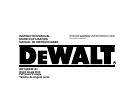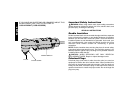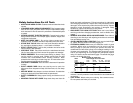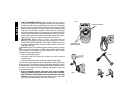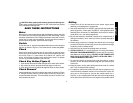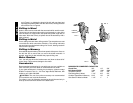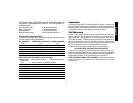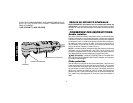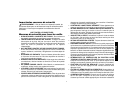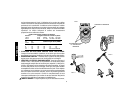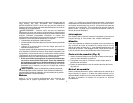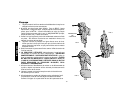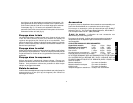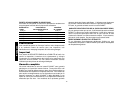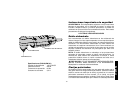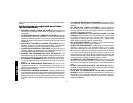
4
as in Figure 5, or holding the head of the drill with one hand and
operating the paddle switch with the other hand, holding the back
end of the drill as in Figure 6.
Drilling in Wood
Holes in wood can be made with the same twist drills used for metal.
These bits may overheat unless pulled out frequently to clear chips
from the flutes. For larger holes, use spade bits, power auger bits, or
hole saws. Work that is likely to splinter should be backed up with a
block of wood.
Drilling in Metal
Use a cutting lubricant when drilling metals. The exceptions are cast
iron and brass which should be drilled dry. The cutting lubricants
that work best are sulphurized cutting oil or lard oil; bacon grease will
also serve the purpose.
Drilling in Masonry
Use carbide tipped masonry bits at low speeds. Keep even force on
the drill but not so much that you crack the brittle materials. A
smooth, even flow of dust indicates the proper drilling rate.
Motor Brushes
Your tool will stop when the brushes wear out (down to about 3/16"
(5mm) long). This prevents damage to the motor.
Accessories
Recommended accessories for use with your tool are available at
extra cost from your local dealer or authorized service center.
If you need assistance in locating any accessory, please contact
D
EWALT Industrial Tool Co., 701 East Joppa Road, Baltimore, MD
21286 or call 1-800-433-9258.
CAUTION: The use of any other accessory not recommended
for use with this tool could be hazardous.
For safety in use, the following accessories should be used only in
sizes up to the maximums shown in the table below.
English
FIG. 4
FIG. 6
FIG. 5
PADDLE
SWITCH
MAXIMUM RECOMMENDED CAPACITIES
Chuck Size 3/8" 1/4" 3/8"
Drill Speed (RPM) 1200 1200 2000
Twist Bits in Metal 3/8" 1/4" 3/8"
Flat Boring Bits in Wood 1-1/4" 3/4" 3/4"
Carbide Tipped Bits in Masonry 9/16" 1/2" 1/2"
Hole Saws in Wood or Metal 1-1/4" 1" 1"



